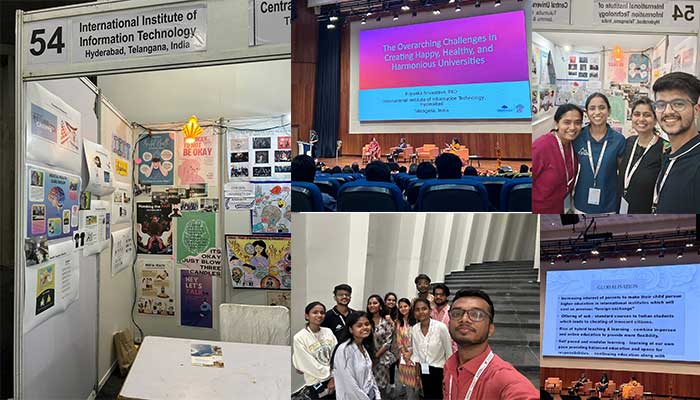IITH hosted the National Well-being Conclave 2024 on 9 and 10 November. IIITH was one of 93 institutes participating in the conclave and shared the institute’s best practices through an exhibition stall. This was the first national-level conclave that brought together students and faculty to discuss their experiences with mental well-being and explore ways to improve it.
Two students, Hardik Mittal and Bipasha Garg, along with three faculty members – Dr. Priyanka Srivastava, Dr. Bhaktee Dongaonkar, and Mr. Shatrunjay Rawat, attended the conclave and shared the institute’s initiatives at the individual, community, and institutional levels. Hardik and Bipasha championed the student volunteer and community care support group, emphasising how the group has been instrumental in bridging the gap between students and professional mental health services. Special appreciation goes to Bipasha and Hardik for organising and creating these excellent posters with the help of first year volunteers.
Priyanka Srivastava also delivered a talk on The Overarching Challenges in Creating Happy, Healthy, and Harmonious Universities, where she shared the IIITH current practices and vision for integrating mental well-being into academic programs. The talk emphasised the importance of systematic changes within universities to foster a mental health inclusive academic culture while maintaining academic rigour, and promoting an inclusive, diverse, and pluralistic campus community.
Additionally, her talk highlighted the need to strengthen the community care program, including introducing psychological first aid as a life skill to support individuals during psychological crises, alongside expanding mental health professional services on campus. One of the much-appreciated aspects of her session was about the ongoing initiatives at IIITH, which provide support at institutional, individual, and community levels, for example, psychological first aid training for Apex members, dialogue with faculty and staff regarding mental health challenges, the initiation of a mental well-being inclusive academic program, and volunteer support group, among others.
Hardik Mittal and Bipasha Garg share their experience and views below:
It was an honor to participate in such a significant event, which brought together representatives from over 90 institutions. The conclave was an enriching experience for us. Not only did we have the opportunity to set up our own stall, but we also explored the exhibits of other institutes, gaining valuable insights.
The ice-breaking session, especially tailored for students, was a highlight of the program. It was engaging and helped foster meaningful connections with peers from diverse backgrounds. The bonding we developed during these activities truly enhanced our overall experience.
The sessions were incredibly insightful, helping us realize and learn numerous strategies and practices that we can incorporate into our lives as students. Moreover, we discovered ideas we could share with and teach our peers, further promoting well-being within our own community.
Additionally, we participated in a group activity that involved preparing a presentation or act to showcase on the second day of the event. Collaborating within our assigned groups was both fun and intellectually stimulating, allowing us to learn and grow together.
Overall, the conclave was a perfect blend of learning, collaboration, and camaraderie, leaving us with unforgettable memories and valuable takeaways.
Key takeaways from the Conclave:
- Institutions play a critical role in addressing students’ campus life issues, including both academic and non-academic challenges.
- Strengthen the campus mental well-being team and improve engagement with the community.
- Create a support group for faculty too and develop a mentorship program, alongside mental well-being resources catering faculty need.
- Establish a well-being policy, create a structured framework, and involve local police administration to assist in responding to severe cases such as suicide attempts and lack of parental involvement
- Involving police in the well-being group and GGC will not only strengthen the committee/ group’s functionality but will also aid its creditability from a legal perspective.
- Recognise efforts/contributions of faculty who work towards wellbeing of campus community by investing considerable amount of their time for such crucial activities, and include suitable relevant parameters in the formal assessment of faculty performance.
Dr. Priyanka Srivastava, Dr. Bhaktee Dongaonkar, and Mr. Shatrunjay Rawat also had a meeting with Prof. Namita Ranganatha, Prof. of Education, University of Delhi, who has been instrumental in shaping well-being and ICC policies at the university level.
November 2024

